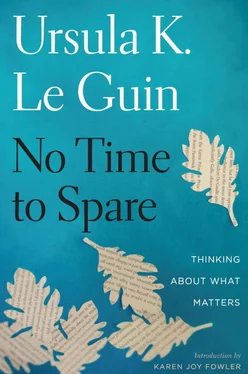Yang, the dominator, always seeks to deny its dependence on yin. Huxley and Orwell uncompromisingly present the outcome of successful denial. Through psychological and political control, these dystopias have achieved a nondynamic stasis that allows no change. The balance is immovable: one side up, the other down. Everything is yang forever.
Where is the yin dystopia? Is it perhaps in post-holocaust stories and horror fiction with its shambling herds of zombies, the increasingly popular visions of social breakdown, total loss of control—chaos and old night?
Yang perceives yin only as negative, inferior, bad, and yang has always been given the last word. But there is no last word.
At present we seem only to write dystopias. Perhaps in order to be able to write a utopia we need to think yinly. I tried to write one in Always Coming Home. Did I succeed?
Is a yin utopia a contradiction in terms, since all the familiar utopias rely on control to make them work, and yin does not control? Yet it is a great power. How does it work?
I can only guess. My guess is that the kind of thinking we are, at last, beginning to do about how to change the goals of human domination and unlimited growth to those of human adaptability and long-term survival is a shift from yang to yin, and so involves acceptance of impermanence and imperfection, a patience with uncertainty and the makeshift, a friendship with water, darkness, and the earth.
January 2013
I’VE NEVER HAD a cat before who directly challenged me. I don’t look for much obedience from a cat; the relationship isn’t based on rank or a dominance hierarchy as with dogs, and cats have no guilt and very little shame. I expect a cat to steal food left out on the counter knowing perfectly well that he’ll be swatted if caught. Greed, and possibly the joy of theft, overrides the slight fear. Stupid human me to leave food out on the counter. I expect a cat who has been scolded or swatted for getting up on the dining table to get up on the dining table and leave little footprints all over it, because he sees no reason to refrain from doing so when I’m not in the room. When found later, the evidence of the little footprints will have passed the statute of limitations. To make any sense to a cat, retaliation for wrongdoing must be immediate. The cat knows that as well as I do, which is why I expect him to do wrong while I’m not in the room, and don’t expect him to do wrong while I am.
To do wrong under my very eyes strains our relationship. It demands scolding, swatting, shouting, flight, pursuit, commotion. It is a challenge, a deliberate invitation to trouble. And this is where Pard is different from the many and various cats who have companioned me. They were all like me—they wanted to avoid trouble.
Pard wants to make it.
He isn’t a troublesome cat. His hygiene is impeccable. He is gentle. He never steals food. (To be sure, this is only because he doesn’t recognize anything but kibbled catfood as food. I can leave the pork cutlets on the counter while he’s waiting hungrily for his quarter cup of dinner kibbles, and he won’t even get up to sniff them. I could put a piece of bacon on top of his kibbles and he would eat them and leave it. I could lay a filet of sole down on him and he would shake it off with contempt and go away.)
He challenges me by doing what he’s forbidden to do. And I guess there really aren’t a lot of things he’s forbidden, besides jumping up on the mantel and knocking off the kachinas.
He isn’t allowed to get on the dining table, but there’s nothing to do there but leave footprints. The mantel, which is a really big jump even for Pard, is the only unprotected display place left in the house for small ornamental things; all the others have found safe havens unreachable even by airborne cats. So jumping up onto the mantel has become his goal, his challenge.
But only if I am in the room.
He’ll spend all day in the living room and never look at the fireplace until I come in. A while after we’ve both been there, Pard begins to glance at the mantelpiece. His eyes get rounder and blacker. He wanders carelessly about on a chair arm (allowed) or side table (allowed) near the fireplace. He stands up on his hind legs to sniff a lampshade or the top of the fire screen very thoroughly with enormous interest, always a little closer to the mantelpiece. Till, usually when I’m not looking but not quite not looking, he’s airborne, and up on the mantel knocking something off. Then scolding, shouting, flight, pursuit, etc.—Trouble! Mission accomplished.
Recently there is an added element: the squirt bottle. As soon as he looks at the mantel I pick up the squirt bottle. The first couple of times, when he made ready to jump onto the mantel and I squirted him, he was totally taken aback. He didn’t even associate the squirt with the bottle. He does now. But it merely adds a new flavor, a new spice, to the Trouble. It doesn’t keep him off the mantel.
I gave in a couple of days ago and moved all the little kachinas to a haven, leaving only the two big ones and some outstanding rocks. But this morning, while I was doing downward dog with my back turned, Pard jumped up onto the mantel and knocked off the lump of Tibetan turquoise, taking a chip out of it when it hit the hearth.
The ensuing Trouble was pretty intense, although I never could get anywhere near close enough to swat him. He knew I was mad. He has been terribly polite ever since, and inclined to fall over and wave his paws in an innocently endearing manner. He’ll go on that way till we’re all in the living room this evening and the need for Trouble arises in him again.
This little cat so deeply shaped by human expectation, the tamest cat I ever had, has a flame of absolute, willful wildness.
I’m sure some of it’s the boredom factor—a young cat with old people, an indoors cat… But Pard doesn’t have to be an indoors cat. He chooses to.
The cat flap is opened for him all through daylight, at his request or at our suggestion. Sometimes he goes out onto the deck, looks down into the garden, birdwatches for a few minutes, and comes back. Or he may go out and turn right around and come back. Or he may say, Oh, no, thanks, it’s very large out there, and quite cold this time of year, so I think I’ll stand here halfway out the cat flap for a while and then back back in. What he doesn’t do is stay out. When the weather warms up and we’re outside too, he will, but not enthusiastically. He’ll go out and go down and eat some of the kind of grass that makes him throw up and come back indoors and throw it up on the rug. That isn’t Trouble-making, it’s just Cat-being.
There is no moral to this story, and no conclusion. Wish me luck with the squirt bottle.
Pard and the Time Machine
May 2014
PEOPLE WHO THINK of me as a Sci-Fi Writer will not be surprised to hear that there is a Time Machine in my study. So far it hasn’t transported me among the Eloi and the Morlocks or back among the dinosaurs. Fine with me. I’ll take the time I got, thanks. All my Time Machine does is save stuff from my computer and provide interest and occupation to my cat.
In Pard’s first year with us he spent a lot of time on beetles, because we had a lot of them. The box elder beetle is now endemic in Portland, having shifted its allegiance from box elders, which we don’t have, to big-leaf maples, which we have lots of. And so we have beetles, who live under the siding boards of the house and breed, and swarm, and creep and seep impossibly through nonexistent crevices of the window frames into the house, where they mass on sunlit windows and blunder about infuriatingly, getting under pillows and papers and feet, and into everything, including cups of tea and Charles’s ears. Mostly they crawl, but they fly when alarmed. They are rather pretty little beetles, and harmless, but intolerable, because (like us) there are too many of them for their own good.
Читать дальше












